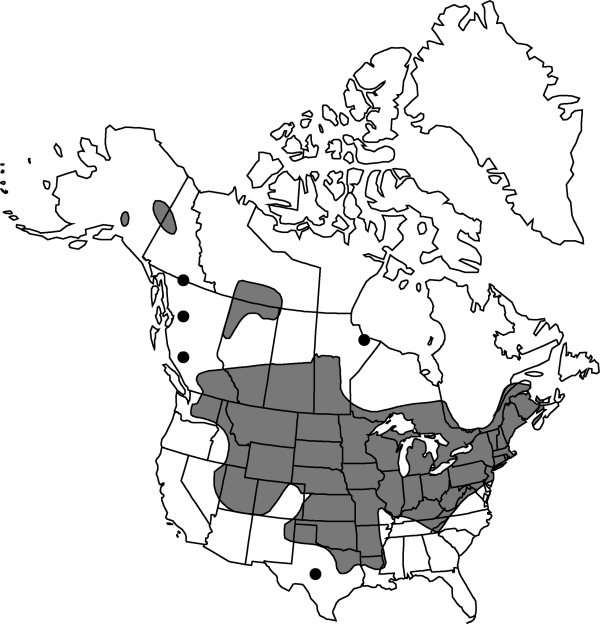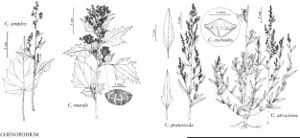Chenopodium simplex
Atlantic J. 1: 146. 1832.
Stems erect, branched, 3–15 dm, glabrous. Leaves nonaromatic; petiole 0.15–0.45 cm; blade ovate to triangular, 3.5–15 × 2–9 cm, base cordate to truncate, margins sinuate-dentate with 1–5 coarse, acute teeth, distal leaves entire or with few small teeth, apex acute, glabrous. Inflorescences glomerules in terminal and lateral spikes and panicles, 6–15 cm; glomerules irregularly globose, flowers in different stages of development, 0.5–2 mm diam.; bracts absent. Flowers: perianth segments 5, connate into 0.5 mm tube; lobes ovate to lanceolate, 0.7–1 × 0.4–0.6 mm, apex retuse, slightly keeled, glabrous, margins meeting or separated by as much as their width, exposing more than 1/2 fruit at maturity; stamens 5; stigmas 2, 0.1 mm. Achenes depressed-ovoid; pericarp adherent, chartaceous, smooth. Seeds lenticular, 1.3–1.9 mm diam.; seed coat black, indistinctly honeycombed to nearly smooth, margins rounded. 2n = 18.
Phenology: Fruiting Jul–Oct.
Habitat: Woods, thickets, hardwood slopes, wooded tallus, nutrient-rich woods, sometimes in waste places and fields
Elevation: 0-1800 m
Distribution

Alta., B.C., Man., N.B., N.W.T., N.S., Ont., Que., Sask., Yukon, Alaska, Ark., Calif., Colo., Conn., Del., Idaho, Ill., Ind., Iowa, Kans., Ky., La., Maine, Md., Mass., Mich., Minn., Mo., Mont., Nebr., Nev., N.H., N.J., N.Mex., N.Y., N.C., N.Dak., Ohio, Okla., Pa., R.I., S.Dak., Tenn., Tex., Utah, Vt., Va., Wash., W.Va., Wis., Wyo.
Discussion
A closely related Eurasian diploid species, Chenopodium hybridum Linnaeus, probably also occurs in North America as introduced. Its occurrence in the New World needs confirmation. Chenopodium simplex differs from its Eurasian counterpart in having a smoother seed coat, a yellowish pericarp that is more adherent to the seed, and a different chromosome number (A. I. Baranov 1964; R. D. Dorn 1988b).
Selected References
None.
